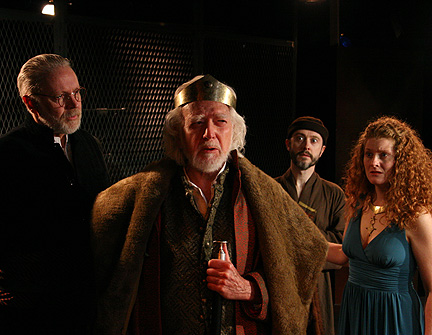
One evening last week, I went to refill a small portable bottle of non-aspirin pain reliever pills that I keep in my audition bag. I opened both the jumbo Costco-sized bottle and the little travel size bottle, and filled the little one with pills from the big one. I replaced the lid on the large bottle, then found myself unable to account for the whereabouts of the lid to the little bottle. I looked everywhere. And then, finally, I looked in a totally insane place: inside the large bottle. Sure enough, it was there. I could account for this mental lapse by pointing to my advancing years, but in truth I think the moment I found the little lid inside the big bottle was the moment I realized my dear friend Donald Grody was gone. The time was out of joint, and the universe was just slightly off now somehow.
The e-mail that afternoon from his wonderful wife, Judith Anderson, had been short and loving. The subject line was simply “Donald” and I knew the contents before I opened the message. I read it over the phone to my partner, Tim, and neither of us knew what to say. Donald had been in the final stage of a long and valiant battle with prostate cancer, so the news was not entirely surprising. I didn’t really have a chance to process the loss that afternoon, as I had to run into the city almost immediately after receiving the note to play Pastor Manders in a performance of Ibsen’s Ghosts. I didn’t tell anyone at the show about Donald; I just whispered something to Donald and Judith privately before making my first entrance. The four of us had been trying to get together for dinner for many weeks, with one thing or another making it not a good time, and now there would be no good time. But Judith’s note assured us that he passed away peacefully in her arms, as they had both wanted. And what actor could ask for a better exit?
There are so many things you should know about Donald, but in all fairness, I didn’t know him long enough to be the one to tell you. He told me great stories about working with Judy Holliday and Ethel Merman, among many others. At one point, he served as Executive Director of our union, Actors Equity Association. In fact, that’s where he met Judith! He was a family man. There’s just so much. I’m hoping that others will chime in with their memories as well. Together, we could write a book. I can tell you this much from my own experience: While in his 80’s he played King Lear. In two productions. And speaking as his Fool in both productions, I can tell you that he was wonderful.
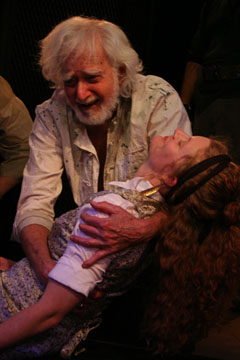
I first met Donald through my friend Mark Nash, who was at the time the Artistic Director of Vermont Stage Company. I knew he was doing King Lear as the company’s first full-scale Shakespeare production, and I had always wanted to play the Fool. Although Mark was directing the production, and had directed me many times before, he said the final casting vote in this case would have to come from the actor playing the tragic king: a man named Donald Grody. I remember thinking: “Oh, dear–I have to impress another actor in order to get this job!” I also wondered how much of an auteur this fellow might be!
I needn’t have worried. I was invited to Donald and Judith’s west side apartment to participate in an informal read-through of the edited script Donald had been working on for many months. Both Donald and Judith made me feel welcome and at my ease immediately; it was impossible not to have a great time in their company. The reading seemed to go very well, and I liked Donald’s editing work–very smart and economical, without sacrificing the poetry or the passion. And besides that, both Donald and Judith were a lot of fun to be around.
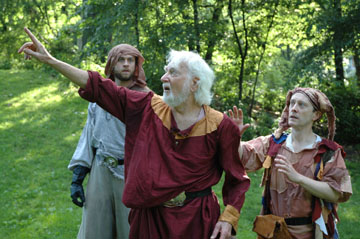
Rehearsals were challenging, but ultimately rewarding. Donald understandably felt protective of his version of the script, and of the production he was carrying, but he remained open to those little moment-to-moment surprises actors love to discover, and together we discovered a great many. I looked forward to our time together onstage each night, because I knew we were going to take each other on an exciting and very personal journey, with the audience tagging along just a few feet away. In our production, the Fool was loyal to Lear to the death, and it made perfect sense to me. In fact, Mark had me double as the physician in the latter half of the play, in an all-white version of my Fool’s costume, so that my “spirit” could continue to watch over Lear. I realized over the course of our time in Burlington that I was on some level becoming Donald’s Fool offstage as well, and I couldn’t have been happier. Donald was becoming a real friend, and also a mentor. He couldn’t believe I didn’t have an agent, and was resolved to do something about that when we returned to New York. Heaven knows, no one else had ever taken such a generous interest in me, with no expectation of anything in return. He just believed I was talented and should be working all the time. He was like that. For my part, I was more than happy to swear my allegiance to this kind (and yes, regal) soul, regardless of anything that might or might not come later. I had found a new and remarkable friend.
The critical and audience response to the production, and particularly Donald’s towering performance, was fantastic. The run sold out, and the time we spent performing together in Burlington was sublime. His wife Judith (about whom he was always speaking: “Oh, wait’ll Jude hears this…!”) and my partner Tim arrived to join the fun, and we all had a great time in Burlington. I remember in particular one evening we dined together at a highly-regarded Asian restaurant called A Single Pebble. When we were seated, the owner came by our table. It turned out she had already seen the production, and had been very moved by Lear and his Fool. She advised on our dinner order herself, sent little treats along the way while we waited for the food, and at the end of the meal, surprised us with some lovely desserts, gratis. Donald and I didn’t say anything in particular to each other, though of course we thanked our host profusely. But he didn’t need to say anything. I knew we were both deeply gratified that someone out there had seen our work, and had been sufficiently affected by it that she wanted to let us know. He was quiet, but beaming. It may seem like a little gesture to some, but to us it was extraordinary. I think we were both simultaneously humbled and proud, and I was so glad to share that moment with him and with the two people we loved most in the world. Attention was paid, to paraphrase Arthur Miller.
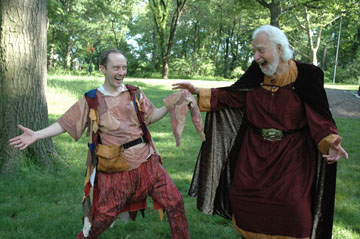
Donald and I went on to do a second production of Lear together the following year, this time for New York Classical Theatre here in New York City. You can see a few additional pictures from it on the rotating banner at the top of this site. The rest of the cast was different, but again it was a wonderful experience–despite the many challenges of performing outdoors on the run in both Central Park and Battery Park over the course of two long, hot (and often rainy) summer months. Remember, Donald was in his 80’s, the age Lear was actually supposed to be! He always seemed to have so much energy, and in moving from location to location, often I found myself needing to keep up with him. While he was a very bright man (did I mention he was also a lawyer?), and didn’t tolerate nonsense for a moment, Donald still approached each new encounter with the innocence and frankness of a child; I saw that in every rehearsal and every performance without exception. I’m glad he got to do his Lear here in New York. I wish he could have done it somewhere indoors for an extended run so that even more people could have seen it. I’ve seen a lot of Lears over the years, including Derek Jacobi’s admirable recent turn. Donald was not a household name, but he stood among them, and bettered many of them. And by the way, Donald did introduce me to his agent, Renée Glicker, of About Artists Agency. I think we bonded because of our mutual fondness for Donald; she trusted his judgment. I began freelancing with her, she came to see us in Lear, and in due course I ended up signing with her. All because I read for a man named Donald Grody in his living room one evening and he took an interest in my career.
Donald and Judith were only able to make it up to our house in Yonkers once together, but it was a lovely summertime visit, and all four of us enjoyed just hanging out on the deck, sipping iced tea and swapping theatrical tales as the lazy day waxed and waned. By then, they had bought a little pied-a-terre in Puerto Rico, and Donald enthusiastically extolled the virtues of the fresh tropical fruits he consumed there every day, insisting they were helping him fight off the prostate cancer better than many of the medicines he was regularly asked to try.
I went to see Donald as Dogberry in New York Classical’s production of Much Ado About Nothing the following summer. He was adorable; so childlike in his innocence and delight that audience members young and old loved him immediately. After that, his health issues began to take up more of his time and energy, and getting together became difficult. But we were still planning another visit right up to the end, and that’s at the heart of who Donald was. He didn’t kid himself or anyone else, but he didn’t give up, either. He faced each new day and each new challenge, well, like a king. And Judith, endlessly patient, resourceful, and devoted, was at his side every step of the way, every inch the queen.
Shakespeare of course didn’t include the Fool at the end of King Lear, but every night of both productions I watched from the wings as Donald died, and the actor playing Kent pronounced “Break, heart; I prithee, break!” as he held the fallen king in his arms. I feel like Kent now. Because this time, of course, there will be no curtain call, no songs in the dressing room, no additional performance.
I will miss you, Donald, but I will also cherish the memories of our time together onstage and off. And I will celebrate your life every time I step onstage. Farewell, my friend.
The weight of this sad time we must obey;
Speak what we feel, not what we ought to say.
The oldest hath borne most: we that are young
Shall never see so much, nor live so long.
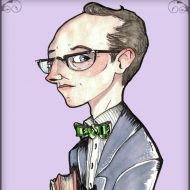
Thank you, Andrew; that was a beautiful, thoughtful reminiscence. And Richard Yarnell, you captured Donald’s Equity work side amazingly well. I hope to see you both at Equity Nov. 10, for his Memorial.
Thanks,
James
Thank you for your note, James; I only wish I could have met your father sooner, and had him in my life longer! I’m afraid I won’t be at the November 10th Memorial, as I’m currently out of town doing a show. But I digitized all the old photos of Donald for Jeremy to use in the presentation, and I’m creating the program for the event. So those will need to be my silent contributions to the day. I’m sure it will be a beautiful session with lots of lovely reminiscences. I’ll be there in spirit!
Hi Andrew…just saw this and it’s so great. Lear was one of those rare shows were everything and everyone felt right. In no small part that was because of Donald and it was a joy to work with him on that wonderful production. He was a lovely man but also had a lot of guts. Playing a massive, load-bearing, Shakespearean role in your 80’s is not for the faint of heart. And he did it so damn well! Thanks for writing this Andrew. I lucked out getting to work with both of you in the same show!
Paul
Paul, the feeling is mutual. You were a wonderful Kent. I had a fantastic time working with you, and I know that Donald did, too. You and I were very lucky to spend that time with Donald. I think it was a great learning experience for us all. 🙂
Don’s tenure as Executive Secretary at Actors’ Equity was where I met and grew to love the man. It was the locus of our work together: I never had the chance to perform with him on stage.
I’d been an Actor, working mostly in the hinterlands. Family required that I stay closer to home and after finding only a modest amount of work in NY, not enough to support a family, I took Don up on his offer of a job at the Union. I’d worked on several committees, which, because they seemed to center on concerns he too thought important. We began to noodle ways to increase employment, secure a better shake for actors who were lured into unpaid workshops, and assert some better control of actors’ working conditions in showcases that seemed to be a spawning ground for more or less permanent Off-Off-Broadway theatres.
My first project was to take a committee’s recommendation that Equity run its own dance audition studio and find a suitable place to put it. The idea was to make sure that the space was safe for dancers to perform, the intention was to equip it with a floor that met our standards. I was on the board of my Co-op and had more than a passing acquaintance with the agent who also managed what was to become the Equity building in NYC. You should have seen Don’s face when I walked into his office to announce I thought we should buy the building. His “are you insane” look lasted only seconds. After that, it was a matter of enlisting Bill Swire’s help negotiating with Columbia University’s pit bull of a physical plant manager. I don’t remember whose idea it was to buy the land and building separately, but because we did structure the deal that way, when the Union ran through a rough patch and we had to sell the building, we were able to keep the land and the revenue stream it produces.
Off-Broadway, we negotiated the tiered structure that accommodated many theatres, each at their own stage of development. We retained the basic showcase so that work, which everyone except the Council, agreed is vital to developing a career, could continue. But we all knew that Actors did showcases to find jobs and that managers did the same thing. Very talented ones, grew careers and theatres. Establishing a progression of levels through which budding theatres could navigate proved, I think, beneficial to everyone.
I’d worked at Circle Rep with Marshall Mason, in pick-up one-offs, as well as with small companies that were in the early stages of establishing themselves. Taking this experience, I negotiated a complex Off-Off-Broadway contract with Barry Grove, all under Don’s tutelage, whose enthusiasm exceeded even mine. In retrospect, while I may not have realized how much that contract would change the NY scene, he did.
Once Off-Off Broadway was taken care of, folks outside of Equity cities wanted, and probably needed, similar privileges. Once again, Don grasped the opportunity that “Developing Theatres” could offer for extending employment and the range of theatre throughout the country. LORT theatres were beginning to feed Broadway. We needed a way to feed LORT theatres. It’s been almost 25 years now, but I think some of the first groups I worked with on behalf of Equity are still thriving. That’s another jewel in Donald’s crown.
At this point, Don bumped me into the big leagues and assigned the Production contract to my supervision. I have to say that it wasn’t nearly as much fun as the smaller venues had been. By this time, plays like On Golden Pond and others had moved from their original showcase and Off-Off-Broadway theatres onto Broadway, never entirely leaving the original casts behind. At least, through residual rights, actors were compensated for their part in developing viable productions that attracted commercial interest. Showcase began to be respectable, even in the eyes of the Council.
To keep my hand in, again with Don’s encouragement, I began to work out the Workshop Agreement, using as a rough model, Michael Bennett’s example, A Chorus Line. Between us, we came up with a list of primary objectives: good control of employment conditions and venue; some form of health and welfare; and my own pie in the sky, residual rights. On this last point, some of the more traditional producers stiffened. But people like Michael, who shortly announced he was granting his workshop cast rights to a share of future revenue, took seriously our assertion that there’s a difference between rehearsing a “finished” script and improvising or helping to develop, an incomplete play, musical, or production concept.
The League accepted our argument that, in some cases, their producers chose Workshop because there was uncertainty about a property that wouldn’t support the expense of a full blown production and paid rehearsal period which starts the clock running on so many future rights. The more enlightened among them also understood that in some Workshops, actors stepped beyond the role of performer and contributed to the property itself, thus deserving some compensation if a production of the property succeeded. A surprising number of Workshops have made it to full Production and even beyond that. Only because it was the first to go platinum, Dream Girls was my favorite with Nine a close second. You’d be surprised how much of a “royalty” 1/4% or 1/2% adds up to over time. Even some plays that failed in Workshop proved the contract’s value to the League. Millions were saved to be invested in other productions later. It was Don’s vision and support, even prodding, that enabled Equity to gain recognition for its members that hadn’t been accorded them until his tenure began.
Don could be tough in the trenches, but I thought he had a warm and constructive relationship with producers at all levels. Having been a Chorus performer and actor, he had an appreciation for the actors’ lot that some who have succeeded him have not had. As a lawyer, he could speak authoritatively with the business side of production offices. His over-arching instruction though was that, in the end, we needed each other, Actors and Producers. In a high stakes environment, our relationship with the Producers was, I thought, remarkably warm and constructive.
There’s another thing about his service to Equity that paid dividends big time. In the (then) new building, Don’s office was alongside Judith’s. She kept him organized and the rest of us out of his hair most of the time. One of my great pleasures was to check in with Judith on the way to consult with Don: she sat, stunning and blond, in a sea of Emerald green carpet, a model of efficiency but always kind and warm. I’m not the only one who rejoices that the two of them heeded our unvoiced advice that they should make a life together.
I only saw Don perform professionally once. I can’t even recall the name of the play. I was nervous: what if I didn’t like his work? What if my partner, to whom I’d described Don in terms one usually reserves for statesmen and kings, didn’t like him or his work? I shouldn’t have worried. His presence commanded the stage, even in his subordinate roll. His powerful Bass voice riveted us to our seats. At that moment, even though I knew of the tremendous work he’d done at the Union, I couldn’t help but lament the fact that he’d spent so much time away from performance. It was so clear that he was a performer, a talented performer, to the marrow.
Thank you for your account of his two productions of Lear. Needless to say, the part was important to him and he would indeed, have been a fool to ignore his fool.
Richard–Thank you for all you’ve done for actors, and for sharing this wonderful account of your time with Donald at Equity. I was hoping for just such a contribution, and yours is full of fascinating information. I hope that more people who knew Donald, personally or professionally, will contribute their brief stories about Donald to this post as well, for Judith and all of us to read, remember, and enjoy. Donald was a remarkable man indeed.
Thank you, Andrew for bringing to life this amazing man and actor. I am grateful on your behalf that you found such a friend and mentor. It sounds like the stage has lost a “king’ indeed and how can we express our gratitude for the hours of delight and wonder he so generously provided?
Thanks for your note, Alice. I’m glad if my post gave you some idea of the many ways in which Donald was special, even though you never had the opportunity to see him perform yourself. He was a wonderful person onstage and off, and will be much missed.
Andrew: I don’t know if you remember me, but I’m the Chair of the Board of New York Classical. Thank you so much for posting this. It’s a loving tribute.
Jon
Hey there, Jon — Thanks so much for your note. I know Donald did three shows for NY Classical; it’s great that so many New Yorkers were able to see his wonderful work for free. We’re all lucky to have had him in our lives.